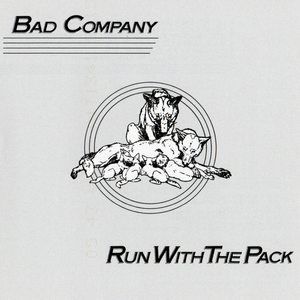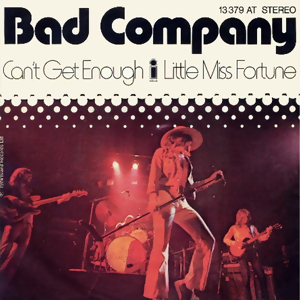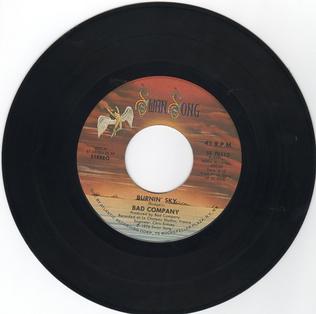
"Ain't That a Shame" is a song written by Fats Domino and Dave Bartholomew. Domino's recording of the song, originally stated as "Ain't It a Shame", released by Imperial Records in 1955, was a hit, eventually selling a million copies. It reached number 1 on the Billboard R&B chart and number 10 on the pop chart. The song is ranked number 438 on Rolling Stone magazine's 500 Greatest Songs of All Time list.

Run with the Pack is the third studio album by English supergroup Bad Company. It was released on 30 January 1976, by Island Records. The album was recorded in France using the Rolling Stones Mobile Truck in September 1975 with engineer Ron Nevison, and mixed in Los Angeles by Eddie Kramer. It was the only original Bad Company album without artwork from Hipgnosis, instead featuring artwork from Kosh.
"Bad Company" is a song by the hard rock band Bad Company that was released on their debut album Bad Company in 1974. Co-written by the group's lead singer Paul Rodgers and drummer Simon Kirke, the song's meaning comes from a book on Victorian morals. Ultimate Classic Rock critic Matt Wardlaw described the song as having a "western vibe" and Rodgers has said that it has "an almost biblical, promise-land kind of lawless feel to it."

"No Matter What" is a song originally recorded by Badfinger for their album No Dice in 1970, written and sung by Pete Ham and produced by Mal Evans.

"Can't Get Enough" is the debut single by English rock supergroup Bad Company. Appearing on the band's 1974 self-titled debut album, it is their biggest hit and is considered their most popular song. It reached No. 5 on the Billboard Hot 100 singles chart and No. 1 on Cashbox magazine's Top 100 Singles chart. The song is also frequently played on classic rock radio stations.

"Day After Day" is a song by the British rock band Badfinger from their 1971 album Straight Up. It was written by Pete Ham and produced by George Harrison, who also plays slide guitar on the recording. The song was issued as a single and became Badfinger's biggest hit, charting at number 4 in the United States and number 10 in the UK, ultimately earning gold accreditation from the Recording Industry Association of America.

"Feel Like Makin' Love" is a song by English supergroup Bad Company. The power ballad originally appeared on their second LP, Straight Shooter (1975), and was released as a single in June of the same year by Swan Song Records. It was named the 78th best hard rock song of all time by VH1.

"Cold as Ice" is a 1977 song written by Lou Gramm and Mick Jones that was first released by British-American rock band Foreigner from their eponymous debut album. It became one of the best-known songs of the band in the US, peaking at No. 6 on the Billboard Hot 100. It was initially the B-side of some versions of the "Feels Like the First Time" 45 rpm single.

"Ride My See-Saw" is a 1968 single by the English progressive rock band the Moody Blues. It was written by the band's bassist John Lodge, and was first released on the Moody Blues' 1968 album In Search of the Lost Chord. It was the second of two singles from that album, the other being "Voices in the Sky".

"I'm Just a Singer (In a Rock and Roll Band)" is a 1973 hit single by the English progressive rock band the Moody Blues, written by the band's bassist, John Lodge. It was first released in 1972 as the final track on the album Seventh Sojourn and was later released as a single in 1973, with "For My Lady" as its B-side. It was the second single released from Seventh Sojourn, with the first being "Isn't Life Strange", which was also written by Lodge.

"Dream Police" is a song written by Rick Nielsen and originally released in 1979 by the American rock band Cheap Trick. It is the first track on the group's album of the same name. The single peaked at #26 on the Billboard Hot 100. Nielsen has stated that the song "is an attempt to take a heavy thought - a quick bit of REM snatched right before waking up - and put into a pop format." He also stated that "the song was about Big Brother watching you."

"Isn't Life Strange" is a 1972 single by the English progressive rock band the Moody Blues Written by bassist John Lodge, it was the first of two singles released from their 1972 album Seventh Sojourn, with the other being "I'm Just a Singer ", also written by Lodge.

"Baby Blue" is a song by Welsh rock band Badfinger from their fourth studio album, Straight Up (1971). The song was written by Pete Ham, produced by Todd Rundgren, and released on Apple Records. As a single in the US in 1972, it went to #14. In 2013, the song was prominently featured in the series finale of the television show Breaking Bad. As a result, the song charted in the UK for the first time, reaching #73.

"Rock 'n' Roll Fantasy" is a song by British rock band Bad Company. It was written by vocalist Paul Rodgers and released as the first single from the group's 1979's studio album, Desolation Angels. It is one of Bad Company's best-known songs and has become a staple of classic rock radio.

"Dirty White Boy" is a song recorded by British-American rock band Foreigner, written by Lou Gramm and Mick Jones, and produced by Roy Thomas Baker, Jones, and Ian McDonald. It was the first single taken from the band's third studio album, Head Games (1979). The B-side, "Rev on the Red Line" has also proven to be very popular among fans, but was never released as an A-side. Lou Gramm's trademark scream at the end of the song is missing from this abbreviated version of "Dirty White Boy". The song spent nine weeks in the Top 40.

"Blue Morning, Blue Day" is a song written by Lou Gramm and Mick Jones that was first released as the third single on Foreigner's second album, Double Vision, reaching #15 on the Hot 100, the band's sixth top 40 single in two years, and #45 in the U.K. The song was backed with the Mick Jones song "I Have Waited So Long". "Blue Morning, Blue Day" is also available as downloadable content for the Rock Band series and was released on clear blue vinyl.

"Long, Long Way from Home" is a song written by Mick Jones, Lou Gramm & Ian McDonald that was initially released on Foreigner's debut album. It was the third single taken from the album.

"Movin' On" is a song written by Mick Ralphs that was first released as a single by Hackensack in 1972. It was later most famously included on Bad Company's debut album, on which Ralphs played lead guitar. "Movin' On" was also released as the second single from the album, as a follow-up to "Can't Get Enough" and reached #19 on the Billboard Hot 100 and #30 in Canada.

"Gone, Gone, Gone" is a song by English rock band Bad Company. The song was released as the second and final single from the band's fifth studio album Desolation Angels. The song peaked at #56 on the Billboard Hot 100 on August 25, 1979.

"Burnin' Sky" is a song written by Paul Rodgers and first released by English hard rock supergroup Bad Company. The song was released as the second and final single from the band's fourth studio album of the same name.
















